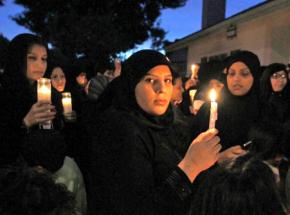Honoring Shaima Alawadi
reports from San Diego on vigils and protests following the savage murder of an Iraqi American woman in her own home.
ON MARCH 28, some 300 people filled the driveway and the street in front of the suburban San Diego home of the late Shaima Alawadi for a candlelight vigil where relatives and community leaders gave their thoughts.
One week before, as her husband drove the family's young children to school and her older daughter slept upstairs, an assailant broke into their house in El Cajon, Calif., and savagely beat Alawadi about the head and neck with a metal rod or crowbar. A few days after, doctors decided they could not save her, and the 32 year-old mother of five was taken off life support.
A horrifying note was left at the scene of the murder, calling the family "terrorists" and telling them to "go back to your country." A similar note had reportedly been delivered to the house a week before.
The murder of Shaima Alawadi comes as the country has been gripped with emotion and outrage because of the killing of Trayvon Martin in Florida. In fact, in the two days following Alawadi's death, there were protests of hundreds each day in San Diego--these demnonstrations had been planned in solidarity with Martin, but quickly incorporated a call for justice for Alawadi. In addition to these and the March 28 event, there were more vigils planned for later in the week.

Standing before the crowd and a dozen reporters, one of the family members recounted Shaima's kindness and generosity, saying that she "never heard anything negative come out of her mouth...Throughout Shaima's life, she has touched so many people, but in her death, she has touched the world."
The attack has brought grief and fear to the sizable Iraqi-American community in the city of El Cajon--one of the most concentrated populations of Iraqi immigrants in the country--and for Muslims of the region.
But for many, the murder of Shaima Alawadi has also galvanized their determination that intolerance and hate crimes have to end. They are drawing the connections between the policies of the U.S. government's "war on terror," the public incitements to violence by supposedly mainstream political figures, and racist violence like what took place in El Cajon, as in Sanford.
After expressing his solidarity with the family of Trayvon Martin, Alawadi's son told the crowd, "We're not done yet. We're going to get justice. Shaima is gone, but she is not forgotten!"
Shaima Alawadi and her husband, Kassim Alhimidi, met in 1991 in a refugee camp in Saudi Arabia, after both had fled Iraq. They, along with some extended family, moved to the U.S. in 1995. Shaima's body was flown back to Iraq to be buried in Najaf, a city that is holy to the country's Shia population.
The El Cajon Police Department has acknowledged the threatening note, but played down the likelihood that this was a racist murder.
"Based on the contents of the note, we are not ruling out the possibility that this may be a hate crime," said Police Chief James Redman. "It was threatening in nature...[But] a hate crime is just one aspect of what we are examining." Earlier, Redman said the department believed the murder was "an isolated incident."
But how many people have to be attacked and killed nationwide before acts of violence against Arabs and Muslims cease to be considered "isolated incidents"?
The war on Muslims and Arabs in the U.S.--being waged by politicians, media figures and police forces, all fueled by the logic of the "war on terror"--is what emboldened someone in El Cajon to murder Shaima Alawadi.


